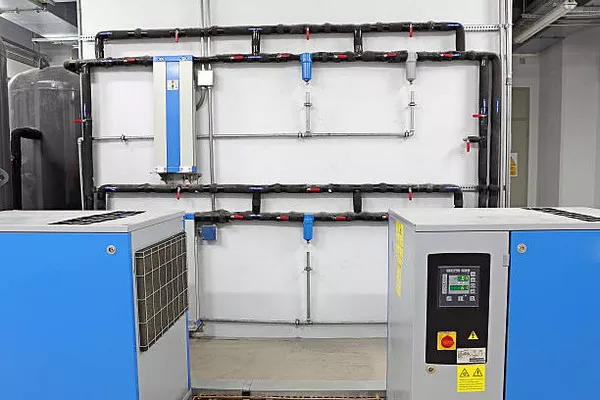Compressed air is a fundamental utility in various industries, serving as a versatile and efficient power source for a wide range of applications. Among the different types of compressors available, screw compressors stand out as one of the most popular choices due to their reliability, efficiency, and versatility. In this article, we will delve into the intricacies of screw compressors, exploring their working principles, advantages, applications, and maintenance considerations.
What is a Screw Compressor?
A screw compressor is a type of positive displacement compressor that operates on the principle of screwing or rotating two helical rotors to compress air or gas. These rotors are typically shaped like twin screws, one male and one female, and they are housed in a precisely machined chamber, often referred to as the compressor’s housing or stator. As the rotors rotate, the air or gas is drawn into the compressor and compressed as it travels through the decreasing volume between the rotors. This process results in increased pressure and the release of compressed air at the outlet.
Working Principles of Screw Compressors
Rotors and Compression
The heart of a screw compressor lies in its rotors. These rotors, usually made of high-quality materials like stainless steel or alloy steel, are precisely machined to fit together with minimal clearance between them. The male rotor has fewer lobes compared to the female rotor, allowing for engagement and displacement of the gas or air. As the rotors rotate, the air or gas is trapped and transported along the helical path, gradually compressing it as it moves towards the outlet.
Compression Stages
Screw compressors can be designed with multiple compression stages. Each stage consists of a pair of rotors, and the air or gas passes through several of these stages to achieve the desired pressure level. Multi-stage screw compressors are capable of delivering higher pressures, making them suitable for applications that require high-pressure air or gas.
Advantages of Screw Compressors
1. Energy Efficiency
One of the primary advantages of screw compressors is their high energy efficiency. Their design minimizes energy waste and ensures a consistent, smooth flow of compressed air. Unlike reciprocating compressors, which have intermittent compression cycles, screw compressors provide a continuous flow, resulting in lower energy consumption and reduced operational costs.
2. Low Maintenance
Screw compressors are known for their durability and low maintenance requirements. Their design minimizes wear and tear, and they have fewer moving parts compared to other compressor types, reducing the need for frequent servicing and part replacements. Routine maintenance mainly involves changing oil, filters, and checking for leaks, making them a cost-effective choice in the long run.
3. Compact Design
Screw compressors are compact and take up less space compared to some other compressor types. This space efficiency is crucial in industries with limited real estate, allowing for more flexible installation options.
4. High Volume Flow
Screw compressors can deliver a high volume of compressed air, making them ideal for applications that require a continuous and substantial air supply, such as manufacturing, automotive, and food processing.
5. Versatility
Screw compressors are versatile and can handle a wide range of operating conditions. They are suitable for various gases, making them applicable in diverse industries, from chemical processing to refrigeration and power generation.
Applications of Screw Compressors
Screw compressors find applications across a multitude of industries, thanks to their efficiency and reliability. Some common applications include:
Manufacturing: Screw compressors are used in manufacturing processes for air tools, pneumatic conveyors, and other production equipment.
Automotive Industry: In the automotive sector, screw compressors are employed for vehicle assembly, tire inflation, and painting applications.
Food and Beverage: Screw compressors provide clean and oil-free compressed air for food and beverage processing, ensuring product quality and safety.
HVAC Systems: These compressors are integral components of heating, ventilation, and air conditioning (HVAC) systems, providing climate control in buildings and homes.
Chemical and Petrochemical: Screw compressors are used to handle various gases in chemical and petrochemical plants, from refrigerants to toxic and explosive gases.
Refrigeration: Screw compressors are critical components in refrigeration systems, including industrial refrigeration, cold storage, and air conditioning units.
Maintenance Considerations
Proper maintenance is essential to ensure the longevity and efficient operation of screw compressors. Here are some key maintenance considerations:
Oil and Filter Changes: Regularly change the compressor oil and filters according to the manufacturer’s recommendations. Clean oil and filters are vital for optimal performance and preventing wear and contamination.
Inspections: Conduct routine inspections to check for oil leaks, loose bolts, and any signs of wear or damage. Promptly address any issues to avoid costly repairs.
Cooling System: Maintain the compressor’s cooling system to prevent overheating, which can damage the machine. Clean cooling fins, check for obstructions, and ensure proper ventilation.
Lubrication: Proper lubrication is essential for reducing friction and wear. Keep an eye on oil levels and ensure the lubrication system is functioning correctly.
Alignment: Periodically check the alignment of the rotors and address any misalignment issues promptly to prevent damage.
Conclusion
Screw compressors are a vital component in numerous industries, offering efficient and reliable compressed air solutions. Their high energy efficiency, low maintenance requirements, and versatility make them a preferred choice for applications ranging from manufacturing and automotive to food processing and petrochemicals. Proper maintenance and care are crucial to ensure the continued performance and longevity of these essential machines, allowing businesses to benefit from their advantages for years to come. Understanding the working principles and advantages of screw compressors can help industries make informed decisions about incorporating these machines into their operations.

